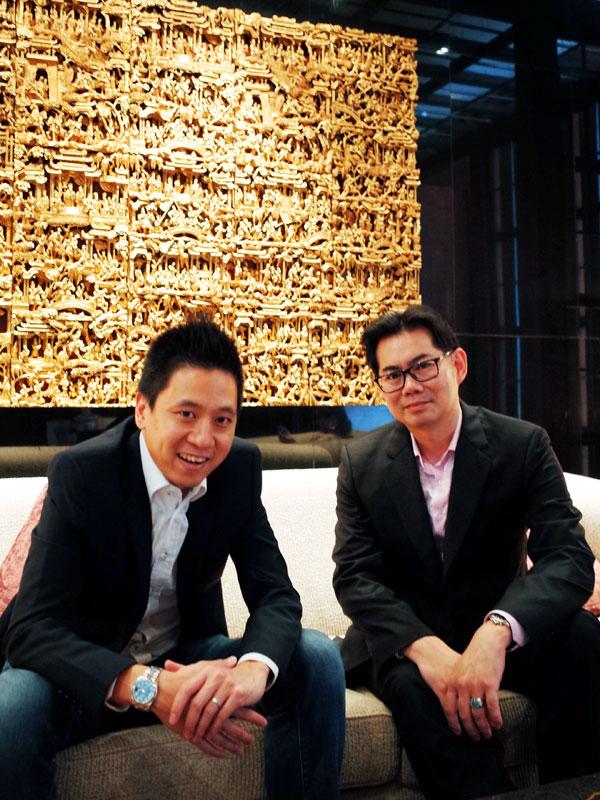Anyone who has tried starting a business will attest to the journey, not for the faint-hearted. Whether you are offering a product or a service, you will have to consider the costs involved, sales and marketing channels, expansion, resources, to name a few. It can all seem daunting, and some businesses may eventually fizzle out without the right support and resources.

Specially catered to meet the unique needs of start-ups, accelerators are established to springboard these emerging companies for success through its full suite services, from ideation to launch to expansion. So how does a start-up figure out if the accelerator truly understands the business challenges and is equipped to meet its needs?
We wanted to understand more about how one accelerator differentiates itself from another, so we caught up with the founders of Shaping Start-ups Inspiring Innovations (SSII) to dig a little deeper. We interviewed Jay Teo (JT), Chief Executive Officer and Lok Yek Soon (YS), Chief Operating Officer of SSII and here’s what they shared:
- We understand that SSII is a joint venture between ZNFrontier and COCOSpace Investments and is considered one of China’s premier start-up ecosystem builders. So what differentiates SSII from other accelerators?
JT: SSII is the first Sino-Singapore full-service accelerator focused on helping start-ups from initial ideation to gaining traction and scaling beyond their native country (i.e. China or Singapore). There are many incubators and accelerators out there, but they usually focus only on the initial incubation period of three to six months. We want to change that.
Studies have shown that many start-ups failed to gain traction after the Minimum Viable Product (MVP) stage because they could not anticipate the challenges ahead of them. Start-ups that do not have relevant traction are likely to face lower valuation, increase financial risks, and lose market opportunities. However, we recognise that the launch phase is just the beginning, and we bring to the table a more sustainable approach that allows us to make a real difference that can impact the longevity of start-ups.
- How has a joint venture with COCOSpace Investments made a difference to what SSII can offer?
JT: COCOSpace Investments is among the top ecosystem builders in China. Our partnership resulted in a 300,000 sqm incubation space that is now the epicentre for start-ups to ideate, exchange and support each other, thereby creating a vibrant and thriving ecosystem. With support from the Chinese government, we are helping to transform the local economy, drive jobs creation, and bringing to the world solutions that address the challenges we face in our society today. Our nine incubation centres are located along China’s next economic growth area, namely the Yangtze River Delta. Situated at such a strategic location means start-ups are in proximity to the economic heartbeat of China and can react to changes and opportunities more swiftly.
- You are both Singaporeans, yet you have decided to set up SSII catering to start-ups established in China. Why did you choose to focus on China? How has your past experiences come into play?
YS: In addition to founding several start-ups in China and Hong Kong, Jay has extensive experience helping European companies with mergers and acquisitions and implementing localisation processes in China. He was often approached by venture capitalists (VCs) to explore opportunities to globalise their portfolio of companies through his vast knowledge and network, and such frequent requests gave rise to ZNFrontier. I recalled we helped our first client generate a bookable revenue of S$10 million within the first quarter!
On the other hand, I have my roots deeply entrenched in start-ups, having been in a few from Singapore, Germany, and the United States. I have witnessed the rise of dotcoms during the late 90s, the bust and 9/11. Start-ups during those days have little support. Today, we see significantly higher support for start-ups, but I still see businesses making similar mistakes even though decades have passed.
Jay and I are mentors under the National University of Singapore (NUS) Enterprise’s Lean Launchpad. Through that, we interacted with many start-ups and observed that they make similar mistakes and struggled with identical issues. We soon realised such findings are not unique to start-ups in Singapore but is shared by those companies in China. That is why it made perfect sense for ZNFrontier to partner with COCOSpace to create an ecosystem that brings everyone together to achieve great things.
- What are the primary types of start-ups you see in China at present?
JT: As of November 2018, it was reported that there were more than 180 unicorns in China (with a valuation above US$1 billion). Last year, China’s start-ups accounted for more than 47% of global VC funding, compared to 35% for the United States and Canada combined. Today, China’s start-ups are no longer ‘copycats’. Many are in a league of their own, spanning various industries and applications from Industrial IoT 4.0 to artificial intelligence in security, food technology, medical and robotics. Solutions tackling food crisis, medical and security, and the ageing population’s needs will continue to remain popular amongst start-ups. We predict there will be an emergence of start-ups that drives the need for better digital connectivity, automation, alternative energy, electric vehicles, and security needs.
- What are the common challenges/pitfalls faced by start-ups in China?
JT: Many Chinese founders believe their success recipe for China can be duplicated for other markets. For example, we have seen a company with no presentation deck, no email address, and a website that does not introduce the business. This may work in China but will not work elsewhere. Businesses need to understand the cultural differences in each market, and it isn’t wise to adopt a ‘one size fits all approach.
YS: Adding to what Jay has shared, we have also encountered start-ups that skipped market validation altogether and another spending cash to bury the competition. A strategy that works for one company may not work for another. Not every company is a Meituan-Dianping with a massive war chest that can wipe out over 1,000 competitors through price cutting and freebies. At SSII, we assess each start-up individually and help them to approach their business with sustainability and scalability in mind. It is noteworthy for start-ups to know that VCs are placing greater emphasis to understand if the company has a coachable team and whether it has the potential to be globalised.
- If you have to choose one highlight offered by SSII, what would it be?
JT: This December, we will launch our ‘Go Global, Discover Right’ program, where we will bring a group of VCs and senior executives from fast-growing tech companies from China to Singapore. Singapore is a good case study market attributing to its best-in-class regulatory frameworks, is a vital financial hub, and a robust intellectual property centre. More importantly, the two countries’ strong economic ties resulted in many cultural and business exchanges, making it easier for China start-ups to relate while drawing experience from Singapore on how it could achieve success in globalisation. Moving out of the four walls, the trip will present a valuable opportunity for individuals to gain exposure, network and interact with businesses in Singapore.
- What are the programs available, and how does one join SSII?
JT: We know the start-up journey can be lonely, and unless you have walked the journey, you will not fully understand the pressure and frustrations faced. Therefore, we have designed programs catering to companies at different stages always to help.
YS: We encourage founders to come to us with an open mind and readiness to exchange views. The business landscape is always shifting, and part of our expertise is to keep abreast with the changes and be the trusted advisor. We have several programs lined up for 2020, and interested start-ups may connect with us via email (inquiry@ssii.sg), WeChat or LinkedIn for an exploratory chat.

Jay TEO |
LOK Yek Soon (YS) |
- Are there any plans to set operation in Singapore to help homegrown start-ups?
JT: We are always excited about the start-ups and research coming out of Singapore. We have been actively engaging the community in Singapore. We believe SSII can champion the promotion of cross-borders globalisation for companies in Singapore and China and be an accelerator for start-ups. There is immense potential for companies from both countries to tap into each other’s ecosystem and drive growth.
- What are your advice(s) or critical watch-outs to aspiring entrepreneurs?
JT & YS: Our key advice is for founders or aspiring entrepreneurs to always look at the longer term. Do not start the journey with a mindset to build in the hope to sell and exit. Instead, always keep two keywords in mind: Sustainability and Scalability.
As the saying goes, no man is an island. If you are a start-up and have been struggling to do it all and do it well, know that resources cater to your unique needs. It is not necessary to subject your business to a dead end when you can engage an accelerator to give you that boost at any stage. Do not settle for just any accelerator. Engage one that demonstrates excellent credentials and has a strong backing themselves such as SSII that COCOSpace funds. The right accelerator for you possesses a strong understanding of your business, can identify the roadblocks now and in the future, and has a strong network to transform your business for long term success.
Now that you know the secret sauce to avoid the common traps that led to the demise of start-ups, are you ready to have a taste of success?

Artitute
is an online showcase and magazine covering Southeast Asia’s established and emerging visual artists and art scenes.
